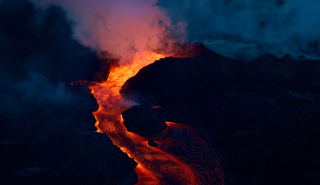Cloud engineering could be ‘painkiller’ for global warming
11 April 2024

Cloud ‘engineering’ could be more effective for climate cooling than previously thought because of the increased cloud cover produced, new research shows.
In a study published in Nature Geoscience, researchers at the University of Birmingham, Reading and other institutions found that marine cloud brightening (MCB), also known as marine cloud engineering, works primarily by increasing the amount of cloud cover, accounting for 60-90% of the cooling effect.
Previous models used to estimate the cooling effects of MCB have focused on the ability of aerosol injection to produce a brightening effect on the cloud, which in turn increases the amount of sunlight reflected back into space.
Professor Richard Allan, a University of Reading climate scientist who co-authored the study, said: “We used volcanic eruptions on Hawaii as a natural laboratory to understand the effect of tiny "aerosol" particles on clouds and sunlight. The research suggests that particle pollution may have increased cloud cover and counteracted warming of climate more than previously thought. However, calls to artificially inject aerosol particles into the atmosphere to offset climate warming are fraught with problems which is why rapidly and massively cutting greenhouse gas emissions is the only sensible way to cure the planet of the human caused global warming disease.”
Natural experiment
The practice of MCB has attracted much attention in recent years as a way of offsetting the global warming effects caused by humans and buying some time while the global economy decarbonises. It works by spraying tiny particles, or aerosols, into the atmosphere where they mix with clouds and with the primary aim of increasing the amount of sunlight that clouds can reflect.
Experiments with the technique are already being used in Australia in an attempt to reduce bleaching on the Great Barrier Reef. However the ways in which MCB creates a cooling effect, and the ways in which clouds will respond to aerosols, are still poorly understood, because of variable effects such as the confounding from co-varying meteorological conditions.
To investigate the phenomenon, the researchers created a ‘natural experiment’, using aerosol injection from the effusive eruption of Kilauea volcano in Hawaii to study the interactions between these natural aerosols, clouds, and climate.
Using machine learning and historic satellite and meteorological data, the team created a predictor to show that how the cloud would behave during periods when the volcano was inactive. This predictor enabled them to identify clearly the impacts on the clouds that had been directly caused by the volcanic aerosols.
They were able to show that the cloud cover relatively increased by up to 50% during the periods of volcanic activity, producing a cooling effect of up to -10 W m-2 regionally. Global heating and cooling is measured in watts per square metre, with a negative figure indicating cooling. Note that doubling CO2 would lead to a warming effect of +3.7 W m-2 approximately on a global average.
The research was carried out in collaboration with the Met Office, the Universities of Edinburgh, Reading and Leeds, ETH Zurich in Switzerland, and the University of Maryland and NASA in USA.
Lead author, Dr Ying Chen, of the University of Birmingham, said: “Our findings show that marine cloud brightening could be more effective as a climate intervention than climate models have suggested previously. Of course, while it could be useful, MCB does not address the underlying causes of global warming from greenhouse gases produced by human activity. It should therefore be regarded as a ‘painkiller’, rather than a solution, and we must continue to improve fundamental understanding of aerosol’s impacts on clouds, further research on global impacts and risks of MCB, and search for ways to decarbonise human activities.”
The research comes alongside increased interest in cloud engineering around the globe. UK Research and Innovation has recently launched a £10.5m research programme looking at informing policymakers on solar radiation management approaches, including MCB, while the Advanced Research and Invention Agency (ARIA), is focused on researching technologies for climate and weather management. In the USA, a team from the University of Washington recently carried out its first outdoor aerosol experiment from a decommissioned aircraft carrier in Alameda, California.
Chen et al. (2024). ‘Substantial cooling effect from aerosol-induced increase in tropical marine cloud cover’ Nature Geosciences, https://www.nature.com/articles/s41561-024-01427-z.
Image: Kilauea Volcano in Hawaii via Wikimedia Commons

